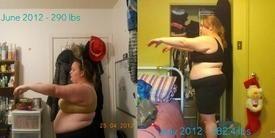Salt

slade37
Posts: 23 Member
I am having a real problem with water retention. If I review the data on MFP I see some days I am over on the sodium by at least 1500. The real irony is the worst salt days are some of my best calorie days. What is the best way to review salt content prior to eating it?
0
Replies
-
Log it first? Read the label first?0
-
I would say: eat natural foods. As in, avoid eating ready-meals, or processed foods/meat as they tend to be high in sodium and low in potassium, whilst you need it the other way around (low sodium, high potassium).0
-
Always read the ingrediants, and mentally know your intake goal for the day.
DONT eat something thats 40% or more of your daily goal - as youll go over!
That's what I do.
If It's 35% or more of my daily goal, I dont bother eating it.0 -
I would say: eat natural foods. As in, avoid eating ready-meals, or processed foods/meat as they tend to be high in sodium and low in potassium, whilst you need it the other way around (low sodium, high potassium).
Ditto.0 -
I've found it really difficult on some diet days to avoid sodium, especially because our high-sodium society has tricked our taste buds into finding salt so satisfying! If you can't find a good way to cut back, up your non-caffeinated, clear, low-sodium beverages: divide your weight in pounds by 2, and drink that many ounces. Water is best, but honestly, anything that fits that description will work.
I know it's tough to drink that much, but it really does make a HUGE difference for water retention and even improves hair and skin. 0
0 -
since your diary isn't public we can't see where you're going wrong..... but some big offenders in the sodium category are:
cheese
bread
salad dressings
packaged lunch meats/sausage/bacon
sauced/seasoned frozen veggies
canned veggies (unless they are no salt added)
spaghetti sauce
dips
pretzels
anything packaged really has a tendency to be high in sodium
just start reading labels. that's what I had to do to get my sodium under control. I used to eat a lot of salads. and the salad dressing KILLED me, even though it was low in calories..... Now I usually stick with ken's light sweet vidalia onion dressing 70 calories, and only like 120mg sodium which is awesome for salad dressing.0 -
I personally never add salt to anything. I try to keep processed/canned food to a minimum. When I have days where my sodium intake is a little higher, I tend to add in another glass of water to help flush it out. When shopping I stick to the outer ring of the store for the most part....that's where all the fresh foods are located.
 It can be tricky at first, but you'll get the hang of it quickly and find that when you do eat something processed that all you can taste is the salt.
It can be tricky at first, but you'll get the hang of it quickly and find that when you do eat something processed that all you can taste is the salt.
PS...I make my own salad dressings too (usually....except when I'm being "lazy" lol)0 -
I would say: eat natural foods. As in, avoid eating ready-meals, or processed foods/meat as they tend to be high in sodium and low in potassium, whilst you need it the other way around (low sodium, high potassium).
Ditto.
thanks, Ive been using that equation. My Dr recommended Q2 and I drink 3 of those a day plus 4 20 ounce bottles. I eat in restaurants mostly so its hard to cut the sodium. I had 10,000 one day on MFP. under calories way over on salt. Chinese food and in particular soy sauce has a lot of sodium0 -
since your diary isn't public we can't see where you're going wrong..... but some big offenders in the sodium category are:
cheese
bread
salad dressings
packaged lunch meats/sausage/bacon
sauced/seasoned frozen veggies
canned veggies (unless they are no salt added)
spaghetti sauce
dips
pretzels
anything packaged really has a tendency to be high in sodium
just start reading labels. that's what I had to do to get my sodium under control. I used to eat a lot of salads. and the salad dressing KILLED me, even though it was low in calories..... Now I usually stick with ken's light sweet vidalia onion dressing 70 calories, and only like 120mg sodium which is awesome for salad dressing.
Thanks I think pasta sauce and salad dressing were a part, but I eat out in restaurants a lot and that is the main source. Its really hard to eat less salt in a place that sells flavor not nutrition0 -
Why do you eat mostly in restaurants? Do you travel for work?0
-
since your diary isn't public we can't see where you're going wrong..... but some big offenders in the sodium category are:
cheese
bread
salad dressings
packaged lunch meats/sausage/bacon
sauced/seasoned frozen veggies
canned veggies (unless they are no salt added)
spaghetti sauce
dips
pretzels
anything packaged really has a tendency to be high in sodium
just start reading labels. that's what I had to do to get my sodium under control. I used to eat a lot of salads. and the salad dressing KILLED me, even though it was low in calories..... Now I usually stick with ken's light sweet vidalia onion dressing 70 calories, and only like 120mg sodium which is awesome for salad dressing.
Thanks I think pasta sauce and salad dressing were a part, but I eat out in restaurants a lot and that is the main source. Its really hard to eat less salt in a place that sells flavor not nutrition
You should especially with salads order dressing on the side. I know it sounds very "unmanly" but its the best way to make sure you aren't overdoing it on dressign (they tend to put WAY more than you actually need. I find most of the time using 1/3-1/2 of what they give me is more than enough.0 -
When you say that you are having a real problem with water retention, are your hands, feet or ankles swollen? if so, have your blood pressure checked. You can do this at most pharmacies for free. Monitor it for a few days. If it's running high, see your doctor. You could have life threatening high blood pressure and not have any symptoms.
Because I have high blood pressure, I use "light Salt" or nothing at all - flavor with lemon or lime to replace salt. Everyone else who responded seems to have great advice about what to avoid and what to eat...0 -
Why do you eat mostly in restaurants? Do you travel for work?
yes I travel a lot Im an environmental consultant0 -
Potassium really helps with excess sodium. Lots of natural foods are high in potassium, or alternately you can use a salt substitute- Morton's makes one and there's another brand called "No Salt" that are essentially potassium supplements, sold in the spice aisle alongside the regular salt.0
-
Log it first? Read the label first?
Occam's Razer? Works for me.
On a related note, potassium has the opposite effect as salt on water retention.
Also, unless you have heath concerns that warrant it, why track sodium?0 -
since your diary isn't public we can't see where you're going wrong..... but some big offenders in the sodium category are:
cheese
bread
salad dressings
packaged lunch meats/sausage/bacon
sauced/seasoned frozen veggies
canned veggies (unless they are no salt added)
spaghetti sauce
dips
pretzels
anything packaged really has a tendency to be high in sodium
just start reading labels. that's what I had to do to get my sodium under control. I used to eat a lot of salads. and the salad dressing KILLED me, even though it was low in calories..... Now I usually stick with ken's light sweet vidalia onion dressing 70 calories, and only like 120mg sodium which is awesome for salad dressing.
Thanks I think pasta sauce and salad dressing were a part, but I eat out in restaurants a lot and that is the main source. Its really hard to eat less salt in a place that sells flavor not nutrition
I have this thing called Meniere's syndrome, which mucks with the sodium/potassium levels in your inner ear and causes vertigo if sodium gets too high. So, I'm pretty much off salt entirely at this point (obviously getting a little, since its already in most foods to some degree).
1. No processed food - if it comes in a can or a bottle or a frozen box, it's pretty much off the list
2. No Chinese food (and man, was this a bummer - I LOVE Chinese food!)
3. Stop eating out - really, just extending #2 to the entire restaurant industry. I know this one is the hardest when you travel for work. I'm a career consultant, and only just got off the road a few years ago. But there are hotels, and not always the expensive ones, that have small kitchens with a stove top, and oven, and a fridge. You can do your own cooking and limit the amount you eat out. (Plus, it's cheaper)
I didn't list 'no table salt,' because really, that's pretty obvious, right?
I've been doing this for quite a while now, and not only have I gotten used to it, but I really don't like overly salted foods at this point. Really, the goal is to take back your taste buds - we're all trained growing up to love salt, but it really doesn't add anything. (Disclosure: yes, of course we need some to be healthy, but you get enough if you just eat natural foods - insert segue into shameless plug for Paleo/primal eating)0
This discussion has been closed.
Categories
- All Categories
- 1.4M Health, Wellness and Goals
- 395.6K Introduce Yourself
- 44.1K Getting Started
- 260.7K Health and Weight Loss
- 176.3K Food and Nutrition
- 47.5K Recipes
- 232.7K Fitness and Exercise
- 446 Sleep, Mindfulness and Overall Wellness
- 6.5K Goal: Maintaining Weight
- 8.6K Goal: Gaining Weight and Body Building
- 153.2K Motivation and Support
- 8.2K Challenges
- 1.3K Debate Club
- 96.4K Chit-Chat
- 2.5K Fun and Games
- 4.3K MyFitnessPal Information
- 16 News and Announcements
- 1.3K Feature Suggestions and Ideas
- 2.9K MyFitnessPal Tech Support Questions












